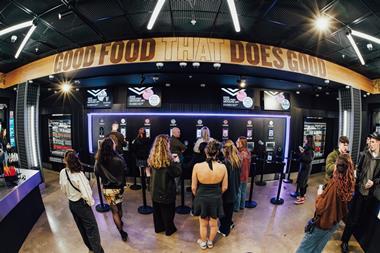Yet it's that determined approach that has fortified the voice of British food and farming during foot and mouth.
The NFU president recalls getting a telephone call in Brussels that was to change his life. The unthinkable had happened the first case of foot and mouth in Britain for over 20 years had been diagnosed.
The news was mind numbing. "We sat back and thought, God, what does this mean?' Nobody, except those who can talk with the benefit of brilliant hindsight, had ever thought we were going to have FMD in our lifetime."
Three days later, as the crisis began to dominate the headlines and TV airtime, a mobile phone call from Newcastle station to then MAFF minister Nick Brown effectively closed the farming community down.
During the ensuing months Gill has become as familiar a public figure as Tony Blair or the Queen. Shaking hands with the PM on the Downing Street doorstep after an FMD crisis session, jousting with John Humphrys on the Today programme or leading a farmers' delegation to Brussels, he is now the best known agri-food figure since the war.
Despite his British pedigree, and after reading agriculture at Cambridge, Gill cut his teeth in Uganda. He spent three years teaching farming at a large secondary school and set up a working school farm producing milk, bananas, sweet potatoes, cotton and maize.
When he first came back to Britain, he ran a 200-sow commercial pig herd in Humberside before returning, in 1978, to the family's 360-acre mixed farm at Hawkhills in North Yorkshire where he now lives with his wife Carolyn.
Life since FMD has been a constant treadmill with a daily round that would have mentally destroyed many a man half his age. Yet spend just five minutes with him in his office in London's Shaftesbury Avenue and you're left with the impression that, so far, he's come out of the experience pretty well unscarred. And, as for his salvoes in defence of beleaguered farmers, he's unbowed.
Some commentators have suggested Gill is far too close to government, a view he has spent months vehemently denying. He points out that this is a charge levelled at all NFU presidents and take recent months is inaccurate. However, he admits that working with Nick Brown was an uplifting experience. "Nick was very different. He was a rare commodity an honest politician who listened to the arguments before making a decision. Many have said: What a pity he's gone. That man really was trying on behalf of our industry. We thought that man was right. Why take him away now?'
"Even extreme right-wingers have said how much they appreciated the work he accomplished."
Gill is reserving judgement on DEFRA which replaced MAFF as the industry's sponsoring ministry after the election. "It's like respraying your car and then being asked if you are happy with the way it runs now'. We want to see how effectively the roles of the old Department of the Environment can be integrated with MAFF.
"There is unique potential for Margaret Beckett and DEFRA to be a different body which can fundamentally revisit the ministry's role. The word food' was not originally in DEFRA's title. So we stuck out for it. I am not worried about agriculture' not being there, because food and agriculture are one and the same. Agriculture produces key parts of the raw material for the food industry and together they account for a fifth of our GDP."
So how does he get on with Tony Blair, given their many meetings? "He's had a steep learning curve. Four years sounds a long time, but Labour had a major disadvantage of not being in government for so long."
But does the PM understand food and farming? Gill's answer is swift. "Yes, in as much as he can understand any one part of his electorate. He has to juggle farming with Northern Ireland, world affairs, the car industry, health, police, roads, the environment, the CAP and enlargement of Europe. When I have an argument he is prepared to listen and try and understand the point."
As well as being a forthright public speaker, Gill is an accomplished tv and radio performer with an armour-plated, canny edge a talent he gratefully admits was honed by former Today programme stalwart Peter Hobday. Not that the training was easy. "On the first day he destroyed me. I was looking for the nearest tall building to jump off. But, 24 hours later, he had taught me the tricks of the trade."
But in the face of doubting politicans and a media alternating between sympathetic and openly hostile, Gill guiltily admits he has occasionally lost the calm, authoritative persona that came from the Hobday training.
He became especially angry when Lord Haskins, the government's rural recovery co-ordinator, was reported to have been critical of UK farmers. "Obviously there are times when I become angry, but it is important to remain constructive. I was annoyed when I appeared on BBC TV's Breakfast with Frost and it happened again when I appeared on Channel 4. Haskins' comments were insulting to an industry which has gone through absolute hell."
But, with a wry smile, he goes on: "I am regularly told that I must recognise I will have to put up with the nasty criticism. Some of it has been highly political. When I have asked certain journalists why they have taken this approach they have privately admitted they were acting on clear direction from their editors, even though they did not want to take that line. There are political agendas out there. My job is to try and row down the middle. The easy part for any political lobbyist is to sit on the outside and simply be critical. The difficult bit is to be critical but still retain your negotiating position."
But while he proudly wears the regalia that goes with the office of NFU leader, Gill, who received the CBE in 1996 for services to agriculture, is quick to tell you he believes he also holds an important wider brief as a food chain figure. "I came into this job with some degree of nervousness about how I would be regarded in the food chain. I realised I could only build credibility by taking positions on a considered basis and sticking to them."
A passionate supporter of efforts to unite the chain, he diplomatically stops short of condemning supermarket power. Nevertheless, he has been at the forefront of efforts to persuade the DTI to introduce a trading code of practice for the top five multiples and their suppliers.
"It's often not properly understood that the balance of power with the supermarkets in the UK is no different to anywhere else in Europe. But our supermarkets are probably the most efficient anywhere in the world, efficient in distribution networks, efficient in the way they organise themselves. And we as farmers in Britain, unlike others in Europe, don't have a matching size to counterbalance this and have a history of being very badly organised. That's the major change we must introduce."
Gill regularly meets senior executives of the major multiples, a frank dialogue which he believes must foster better understanding. Nevertheless, he believes that the Rip-off Britain issue among UK producers has not completely disappeared. "It's simmering just beneath the surface among my membership. They continue to see the enormous differential between the farmgate price and the retail price. That is a headache, and we must overcome it."
But the diplomat in Gill surfaces when he adds: "I think, however, there is increasing recognition it would not serve us well for supermarket prices to fall. More importantly, we need to rid ourselves of some of the myths in the food chain, and I am talking seriously with leading figures about how we might start to tell the truth about food production by answering certain simple questions.
"How many consumers really know what's involved in producing the ingredients for a salad they buy at the supermarket? Do consumers really know what goes into ensuring those products are safer than they have ever been, or how they are distributed from farmgate to store?
"That is the sort of story that the food chain, in partnership together, must start projecting. Farmers cannot put that message over in isolation."
Next week, Gill takes a brief break from matters entirely British when, as president, he heads up the three-day Confederation of European Agriculture Congress in Belfast. A different day, and a wider platform. But the passion, and the polish, will be the same.
{{PROFILE }}
Close menu
- Home
- Retail & Wholesale
-
Products & Suppliers
- Back to parent navigation item
- Products & Suppliers
-
Product Categories:
- Back to parent navigation item
- Product Categories:
- Alcoholic drinks
- Bakery
- Cereals & breakfast
- Cheese
- Chicken & poultry
- Chocolate
- Confectionery
- Crisps, nuts & snacks
- Dairy
- Fish
- Fresh produce
- Frozen
- Household
- Meat
- Own Label
- Sauces & condiments
- Seasonal
- Soft drinks
- Vaping
- Vegan & plant-based
- World foods
- Suppliers
- People
- Reports & Data
-
Topics A-Z
- Back to parent navigation item
- Topics A-Z
-
Popular topics:
- Back to parent navigation item
- Popular topics:
- Cost of living crisis
- Crime
- Deposit Return Schemes
- Finance
- Government & Regulation
- Health
- Inflation
- Loyalty
- Marketing
- Mergers & Acquisitions
- New Product Development
- Sourcing
- Supply chain
- Sustainability & environment
- Technology
- Ultra Processed Foods
- Vaping
- A-Z all topics
- Content by type:
- Events
- Ask iA (beta)
- Subscribe now
Sign in to comment on this article
Not logged in before? Register for FREE guest access today.
You will be able to:
- Read more stories
- Receive daily newsletters
- Comment on stories
Advert















No comments yet